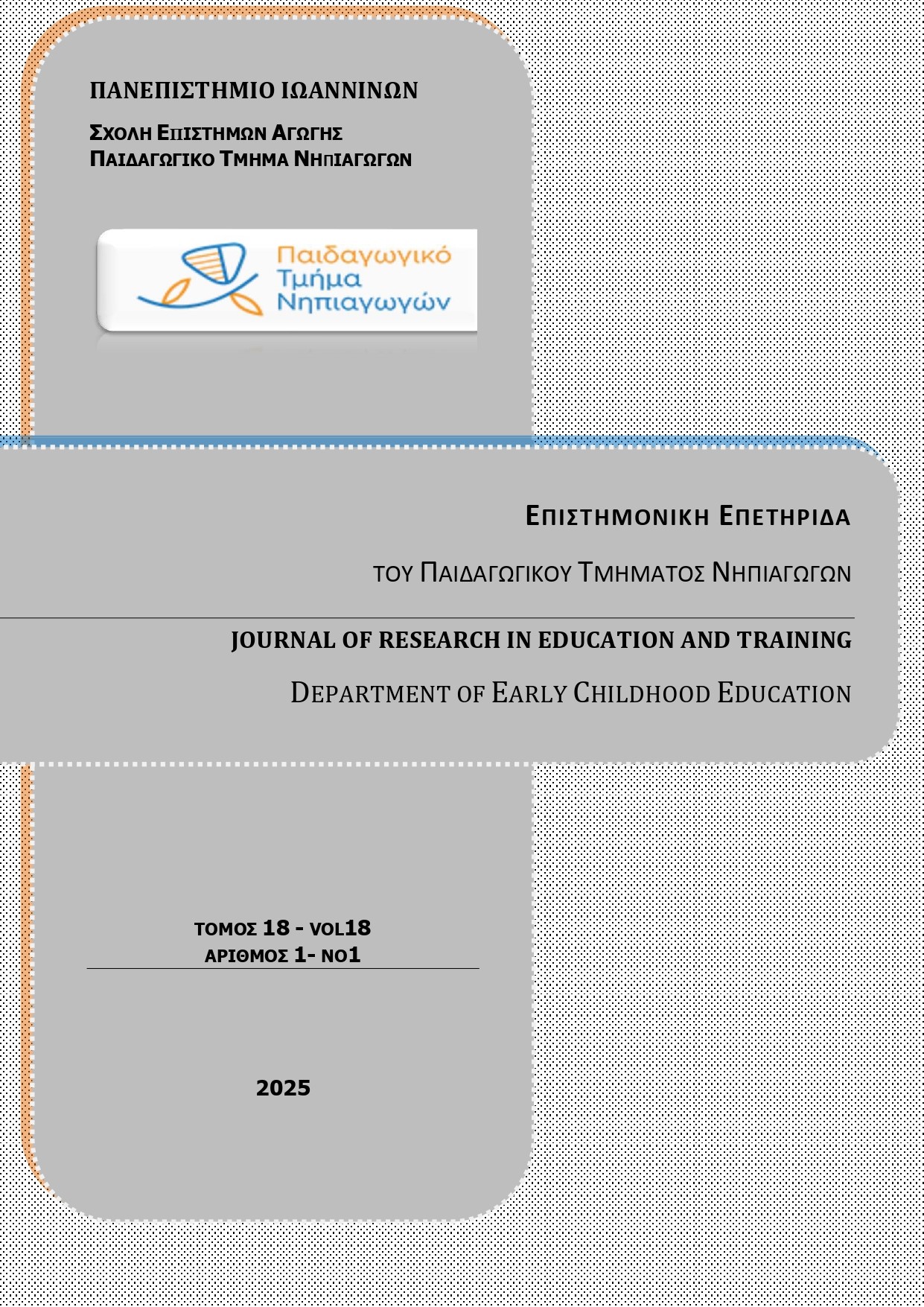Η αξιοποίηση της σχεδίασης για τη διερεύνηση της αναδυόμενης ταυτότητας των μελλοντικών εκπαιδευτικών προσχολικής εκπαίδευσης

Περίληψη
Η ταυτότητα του εκπαιδευτικού επηρεάζει σημαντικά τις εκπαιδευτικές αποφάσεις και τις πρακτικές του στην τάξη καθώς και την επαγγελματική του ανάπτυξη. Η κατανόηση της ανάπτυξης της ταυτότητας του υποψηφίου εκπαιδευτικού είναι ιδιαίτερα σημαντική για την αρχική εκπαίδευση των εκπαιδευτικών, καθώς σε αυτό το στάδιο βιώνει τη μετάβαση από τον ρόλο του μαθητή σε αυτόν του εκπαιδευτικού και προετοιμάζεται για τις πολυπλοκότητες του επαγγέλματος. Στο πλαίσιο αυτό η παρούσα μελέτη διερευνά τις αντιλήψεις των μελλοντικών εκπαιδευτικών προσχολικής εκπαίδευσης για τον επαγγελματικό τους εαυτό και τη διδασκαλία και μάθηση στο Νηπιαγωγείο. Στην έρευνα συμμετείχαν 134 τεταρτοετείς φοιτήτριες. Τα δεδομένα της έρευνας συλλέχθηκαν μέσω των σχεδίων που δημιούργησαν οι φοιτήτριες για να αναπαραστήσουν τον εαυτό τους ως εκπαιδευτικό, τα παιδιά και το μαθησιακό περιβάλλον καθώς και των γραπτών κειμένων που συνόδευαν τις ζωγραφικές τους αναπαραστάσεις. Για την ανάλυση των σχεδίων και των κειμένων αξιοποιήθηκε η μέθοδος της ανάλυσης περιεχομένου. Τα ευρήματα της έρευνας έδειξαν ότι οι συμμετέχουσες είχαν κυρίως θετικές και ιδεαλιστικές απόψεις για την ταυτότητα του εκπαιδευτικού και απεικόνισαν τον εαυτό τους με θετικά χαρακτηριστικά. Οι οπτικές τους για την ταυτότητα του εκπαιδευτικού και τη διδασκαλία και μάθηση στο Νηπιαγωγείο αντανακλούν μια σύνθετη εικόνα που εμπεριέχει παραδοσιακές και σύγχρονες αντιλήψεις για το μελλοντικό τους επάγγελμα. Η παρούσα μελέτη επιβεβαιώνει τα ευρήματα άλλων ερευνών σχετικά με τη χρησιμότητα της σχεδίασης ως αναστοχαστικού εργαλείου που μπορεί να φωτίσει τις εσωτερικευμένες εικόνες των μελλοντικών εκπαιδευτικών για το τι σημαίνει να είσαι εκπαιδευτικός και υπό προϋποθέσεις να συμβάλει στην ανάπτυξη της επαγγελματικής τους ταυτότητας.
Λεπτομέρειες άρθρου
- Πώς να δημιουργήσετε Αναφορές
-
Σοφού Ε. Ε. (2025). Η αξιοποίηση της σχεδίασης για τη διερεύνηση της αναδυόμενης ταυτότητας των μελλοντικών εκπαιδευτικών προσχολικής εκπαίδευσης. Επιστημονική Επετηρίδα Παιδαγωγικού Τμήματος Νηπιαγωγών Πανεπιστημίου Ιωαννίνων, 18(1), 72–102. https://doi.org/10.12681/jret.40355
- Τεύχος
- Τόμ. 18 Αρ. 1 (2025): -
- Ενότητα
- Άρθρα

Αυτή η εργασία είναι αδειοδοτημένη υπό το CC Αναφορά Δημιουργού – Μη Εμπορική Χρήση – Παρόμοια Διανομή 4.0.
Οι συγγραφείς που δημοσιεύουν σε αυτό το περιοδικό συμφωνούν στους παρακάτω όρους :
1. Οι συγγραφείς διατηρούν τα δικαιώματα πνευματικής ιδιοκτησίας επί των άρθρων τους, χορηγώντας στο περιοδικό το δικαίωμα της πρώτης δημοσίευσης. Άρθρα που δημοσιεύονται στο περιοδικό «Επιστημονική Επετηρίδα του Παιδαγωγικού Τμήματος Νηπιαγωγών της Σχολής Επιστημών Αγωγής του Πανεπιστημίου Ιωαννίνων» διατίθενται με άδεια Creative Commons 4.0, σύμφωνα με την οποία μπορούν να χρησιμοποιούνται ελεύθερα, με αναφορά στο/στη συγγραφέα και στην πρώτη δημοσίευση για μη κερδοσκοπικούς σκοπούς.
2. Οι συγγραφείς μπορούν να συνάπτουν ξεχωριστές, πρόσθετες συμβάσεις και συμφωνίες για την μη αποκλειστική διανομή του δημοσιευμένου στο περιοδικό έργου (π.χ. κατάθεση σε ένα ιδρυματικό αποθετήριο ή δημοσίευση σε ένα βιβλίο), με την αναγνώριση της πρώτης δημοσίευσης σε αυτό περιοδικό.
3. Στους συγγραφείς επιτρέπεται να δημοσιεύσουν την εργασία τους online (κατά προτίμηση σε ιδρυματικά αποθετήρια ή στην ιστοσελίδα τους) πριν και κατά τη διάρκεια της διαδικασίας υποβολής, καθώς αυτό μπορεί να οδηγήσει σε παραγωγικές ανταλλαγές, όπως επίσης και παλαιότερες και ευρύτερες παραπομπές δημοσιευμένων εργασιών (The Effect of Open Access)


